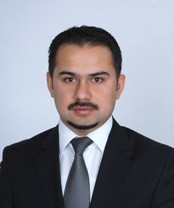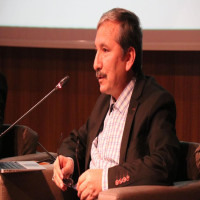Research Article
Issue Reviewers







 Web
Web
Cem Tırınk is an associate professor in the Department of Biometry and Genetics, Faculty of Agriculture, Zootekni at Iğdır University. He continues his academic career by delving into the field of zootekni and specializing in biometry and genetics. His research focuses on data mining, machine learning, population genetics, and genetic data analysis. In addition to teaching biometry and genetics, he has participated in numerous scientific projects and has been involved in national and international efforts to enhance his expertise in the field. Alongside his professional achievements, he places great importance on collaborations within the scientific community and on mentoring.

EPmerasilo: ngaazli .uInckfuonr@mkoactaioelni.edu.tr Web: https://avesis.kocaeli.edu.tr/gazi.uckun
IOnRtCeIrDn: a0t0io0n0-a0l 0R0e2s-0e1a6rc9h-5e4r0 I1D s PYoukbsloisn Rs e/s Weaerbch Oefr SIcDie: n3c2e1 5R6esearcherID: AAR-2897-2020
DEodcutocraatteio, Kno cIaneflio Urnmivaetrisoityn, İktisadi ve İdari Bilimler Fakültesi, İşletme Bölümü, Turkey 1995 - 1998 PUonsdtegrrgardaudautae,t eIs, tUalnubdualğ U Ünniviveerrssititye, sSic, hİkotoisla Odfi BVue sİidnaersis B, Diliemplaerrt mFaeknüt lOtefs Bi, uKsainmeus sY Aödnemtiinmiis tBröaltüiomnü, T, Tuurkrekey y1 1999811 - -1 1999835



Dr Ertan Aslan is a researcher and lecturer in the Faculty of Tourism at Anadolu University. He earned his PhD in Management from Süleyman Demirel University in 2023. The title of his doctoral dissertation is 'The Impact of Destination Branding in Health Tourism on Sustainable Socio-Economic Development: An Application in Pamukkale and Balçova Thermal Tourism Destinations”, which exemplifies his interdisciplinary approach by combining health tourism, destination branding, and sustainable development within the context of destination economic growth.
Dr Aslan’s research interests span a range of disciplines, including accounting, cost accounting, financial derivatives, digitalisation, artificial intelligence, statistics, economics, health tourism and sustainable development. As a faculty member at Anadolu University’s Faculty of Tourism, he teaches courses including Globalisation and Competitive Strategies in Tourism, Digital Tourism, General Accounting, Financial Accounting, Investment and Project Analysis, Cost Accounting and Ethics in Tourism. Through these courses, Dr Aslan demonstrates a strong commitment to fostering strategic thinking and practical competencies among students, preparing them to navigate and lead within the rapidly transforming global tourism landscape. Furthermore, he actively contributes to the advancement of scholarly research by serving as a peer reviewer for nationally refereed academic journals, leveraging his academic expertise.

Doç. Dr. Murat Aygün

Elazığ’da dünyaya gelmiş olan Mustafa Karabulut, ilk ve orta öğrenimini aynı şehirde tamamladı. 1991 yılında Fırat Üniversitesi Fen-Edebiyat Fakültesi Türk Dili ve Edebiyatı Bölümü’nü kazandı. 1995’te bu bölümden mezun oldu. Meslek hayatına 1995 yılında başladı. Gaziantep Mehmet Âkif Ersoy Teknik Lise ve Endüstri Meslek Lisesi, Elazığ Fatih Lisesi, Elazığ Maden Çok Programlı Lisesi (asteğmen öğretmen olarak) ve Elazığ
Mehmet Koloğlu Anadolu Lisesi’nde Türk Dili ve Edebiyatı Öğretmeni olarak görev yaptı. 1995 yılında Fırat Üniversitesi Sosyal Bilimler Enstitüsü Yeni Türk Edebiyatı Ana Bilim Dalı’nda yüksek lisansa başladı. 1997 yılında Şevket Bulut, Hayatı ve Eserleri adlı çalışmasıyla yüksek lisansını tamamladı. 2008’de Fırat Üniversitesi Sosyal Bilimler Enstitüsü Yeni Türk Edebiyatı Ana Bilim Dalı’nda hazırladığı Batılılaşma Açısından Tanzimat Dönemi
Türk Romanı başlıklı teziyle "Doktor" unvanını aldı. 2009- 2014 arasında Adıyaman Üniversitesi Fen-Edebiyat Fakültesi Türk Dili ve Edebiyatı Bölümü’nde Yardımcı Doçent Doktor olarak çalıştı. Mustafa Karabulut, 2014 yılında Doçent, 2019’da ise Profesör Doktor unvanını almıştır. Yazar halen aynı bölümde çalışmakta ve Yeni Türk Edebiyatı Ana Bilim Dalı Başkanı olarak görev yapmaktadır. Ulusal ve uluslararası hakemli dergilerde birçok
yayını bulunan yazar makalelerini; Türk Dili, Belleten, Turkish Studies, International Journal of Languages Education and Teaching, Littera Turca Journal of Turkish Language and Literature, Türk Dünyası Araştırmaları, Hacettepe Üniversitesi Sosyal Bilimler Enstitüsü, Fırat Üniversitesi Sosyal Bilimler Enstitüsü, Çukurova Üniversitesi Sosyal Bilimler Enstitüsü, Dicle Üniversitesi Sosyal Bilimler Enstitüsü, Adıyaman Üniversitesi Sosyal Bilimler
Enstitüsü, Siirt Üniversitesi Sosyal Bilimler Enstitüsü, Hikmet, Bizim Külliye, Türk Edebiyatı, Telmih, Ihlamur, Telmihçe, Sebilürreşâd, Mecmua, Erdem, Edebiyat Ortamı, Alkış, Dergâh, Yedi İklim, Millî Eğitim, TRT Müzik, Esosder, International of Turkish Academic Studies (TURAS), Türk Kültürü ve Medeniyeti Araştırmaları Dergisi, USBAD Uluslararası Sosyal Bilimler Akademi Dergisi, International Journal of Filologia, Dünya İnsan Bilimleri Dergisi, İstanbul Kent Üniversitesi İnsan ve Toplum Bilimleri Dergisi vb. dergilerde yayımladı. Ayrıca birçok kitabı ve sempozyum ve kurultaylarda sunduğu bilimsel bildirileri mevcuttur. Mustafa Karabulut, evli olup iki çocuk babasıdır.



Aim & Scope
It aims to contribute to the studies in this field in Turkey and in the world by publishing articles in Turkish and English produced in different disciplines in the field of Social Sciences.
Original and qualified review and research articles, book reviews, book reviews and case studies on topics within the scope of social sciences can be published in the journal.
Author Guidelines
YENİ YAZIM KURALLARI dosyasına ulaşmak için buraya tıklayınız.
Telif Hakkı Devir Formuna ulaşmak için buraya tıklayınız.
Ethical Principles and Publication Policy
Ethical Responsibilities of Authors
Author(s) submitting manuscripts to Düzce University Journal of Social Sciences are expected to comply with the following ethical responsibilities:
The publication processes applied in Düzce University Journal of Social Sciences constitute the basis for the development and distribution of knowledge in an impartial and reputable manner. The processes implemented in this direction directly reflect on the quality of the work of the authors and the institutions that support the authors. Peer-reviewed studies are studies that embody and support the scientific method. At this point, it is important that all stakeholders of the process (authors, readers and researchers, publishers, referees and editors) comply with the standards for ethical principles. Within the scope of Düzce University Journal of Social Sciences publication ethics, all stakeholders are expected to carry the following ethical responsibilities.
The studies submitted by the author(s) are expected to be original. In case the author(s) benefit from other studies or use other studies, they are required to cite and/or quote them completely and accurately.
Individuals who did not contribute intellectually to the content of the study should not be listed as authors.
All manuscripts submitted for publication must disclose any conflicts of interest and relationships.
The author(s) may be requested to provide raw data on their manuscripts within the framework of the evaluation processes, in such a case, the author(s) should be ready to present the expected data and information to the editorial board and scientific committee.
The author(s) should have a document showing that they have the rights to use the data used, the necessary permissions related to the research/analyses, or that the consent of the subjects of the experiment has been obtained.
In the event that the author(s) becomes aware of an inaccuracy or error in the published, early view or under review manuscript, the author(s) has the obligation to notify the journal editor or publisher and to cooperate with the editor in correcting or withdrawing the manuscript.
Authors cannot have their work in the submission process of more than one journal at the same time. Each application can be started after the completion of the previous application. A study published in another journal cannot be submitted to Düzce University Journal of Social Sciences.
It cannot be proposed to change the author responsibilities (such as adding an author, changing the author order, removing an author) of a study whose evaluation process has started.
As of 2020, TR Index Journal Evaluation criteria have been updated and especially the articles related to the ethics committee permission required in scientific research have been detailed.
The “Documents and information requested for studies requiring ethics committee approval” is not expected to be applied to studies that have been submitted in previous years, the evaluation process has been completed but not yet published, and although the evaluation process continues, the research data used before 2020. It will be mandatory for articles whose process started in 2020 and whose research data belong to 2020. For which articles Ethics Committee Permission Certificate is required is explained below, and articles that are not uploaded to the system and/or do not provide information about Ethics Committee Permission in the article will not be evaluated.
Explanation and Information on Ethical Rules by TR Index
The articles related to the Code of Ethics in the criteria in previous years were elaborated with explanations in 2020, and the issue of “including information about the permission in the article” was added to the criteria, assuming that permissions were obtained for studies requiring ethics committee permission in the field of research.
QUESTION: Is ethics committee approval required for all articles?
No, no. It is also stated in the criteria as articles that “require Ethics Committee Permission”.
Research requiring Ethics Committee permission is as follows:
- All kinds of research conducted with qualitative or quantitative approaches that require data collection from participants using survey, interview, focus group study, observation, experiment, interview techniques
- Use of humans and animals (including materials/data) for experimental or other scientific purposes,
- Clinical trials in humans,
- Research on animals,
- Retrospective studies in accordance with the law on the protection of personal data,
Also;
- Stating that the “informed consent form” has been obtained in case presentations,
- Obtaining and indicating permission from the owners for the use of scales, questionnaires, photographs belonging to others,
- Indication of compliance with copyright regulations for the intellectual and artistic works used
QUESTION: Should retrospective Ethics Committee Permission be obtained for publications produced from studies and theses completed in previous years?
Before 2020, retrospective ethics committee permission is not required for articles that used research data, produced from master's / doctoral studies (must be specified in the article), applied for publication to the journal in the previous year, accepted but not yet published.
Price Policy
No fee is charged to the author or his/her organization under any name.


